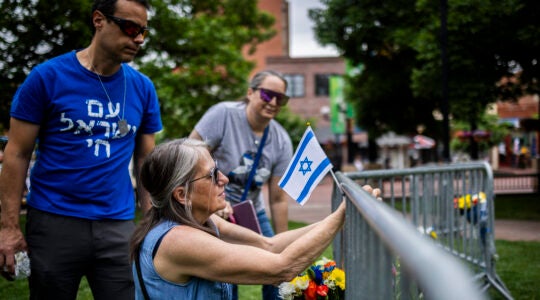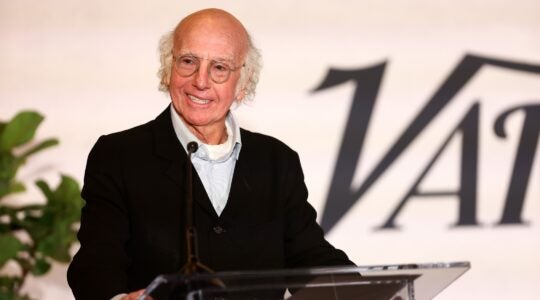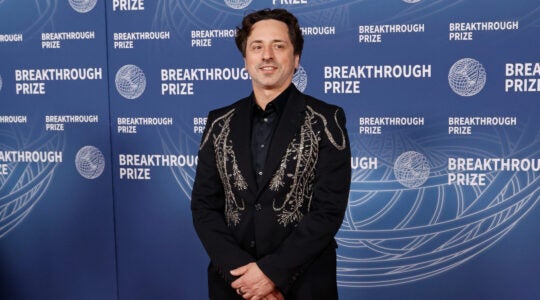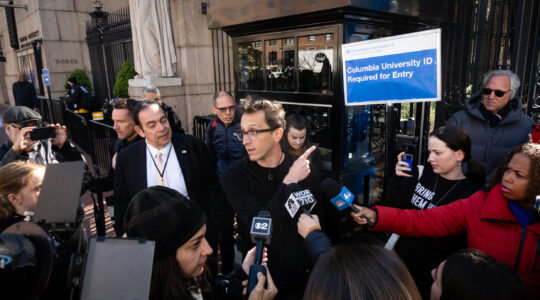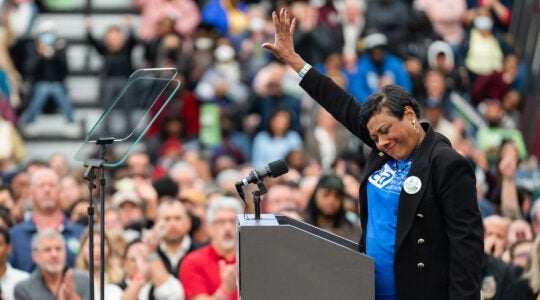NEW YORK (JTA) – A benefit concert at Madison Square Garden was called off two weeks before the show following a ruling by 33 fervently Orthodox rabbis that appeared to condemn all public musical performances.
Lipa Schmeltzer, a popular Chasidic singer who was slated to be the marquee performer at the March 9 concert in New York City known as “The Big Event,” pulled out Feb. 23 after the ruling, known as a Kol Koreh, was published in the Orthodox daily Hamodia.
Days later the entire show was called off and a message posted to the concert Web site announcing that “unforeseen circumstances” had led to the cancellation.
A spokesman for the show’s producer, Sheya Mendlowitz, told JTA that the cancellation had left organizers more than $100,000 in the hole with no way to reimburse ticket holders.
Negotiations between representatives of Mendlowitz and the rabbis aimed at finding a way to let the show go on apparently were fruitless.
The concert was to benefit Simchat Tzion, an organization that covers the cost of catering weddings for poor Israeli orphans.
Schmeltzer’s decision was widely praised in the fervently Orthodox, or haredi, community, and celebrated on religious blogs and in a Hamodia editorial.
“The bottom line is that Gedolei Yisrael [Torah authorities] have spoken, and their message has, baruch Hashem [thank God], been heard,” the paper opined. “That should be music to everyone’s ears.”
Schmeltzer, a widely sought wedding singer, said in a statement that after studying one on one with a leading rabbi, he had resolved never again to perform music composed by a non-Jew. That would preclude performances of the popular wedding song “Yiddin,” whose melody is taken from the 1979 disco track “Dschinghis Khan” by a German pop group of the same name.
News of the ruling and the show’s cancellation have been major news items in haredi circles. One prominent singer, quoted anonymously in Hamodia, said the ruling could have a major impact on the Jewish music industry.
“This is an awakening, a turning point,” the singer said. “It could positively affect the style of music for years to come.”
In issuing the ruling, the rabbis appeared to have decreed a blanket prohibition against all Jewish concerts. But sources familiar with the haredi community told JTA there was much uncertainty surrounding the ruling.
The uncertainty is compounded by the fact that the ruling was said to be a verbatim copy of a similar one issued by Israeli rabbis that resulted in the cancellation of a concert by two popular American Orthodox singers last year. Several observers noted that the ruling published in Hamodia even included references to the earlier Israeli concert.
According to a report in the Jewish Star, a weekly serving a Modern Orthodox readership on Long Island, the ban was the handiwork of a Brooklyn man, Asher Friedman. One signatory confirmed to the paper that Friedman had contacted him about the concert and acknowledged that with timeliness an issue, the rabbis may not have investigated the matter sufficiently.
Friedman declined JTA’s request for comment.
Attempts by JTA to reach several rabbis who had signed the ruling also were unsuccessful. But Binyomin Jolkovsky, the publisher of the Web site Jewish World Review, told JTA that the ruling’s ambiguity may have been intentional.
“The people who understand them understand them,” Jolkovsky said of the rabbis, adding that the rabbinic ruling appears to be a reaction to a creeping secular influence in haredi music.
“I think that the haredi world believes there is a cult of personality that slowly but surely surrounds a lot of the haredi singers,” Jolkovsky said. “I think it’s an effort to stop that.”
JTA has documented Jewish history in real-time for over a century. Keep our journalism strong by joining us in supporting independent, award-winning reporting.
